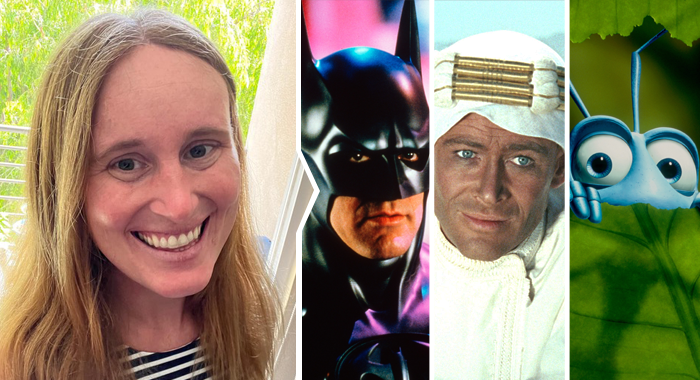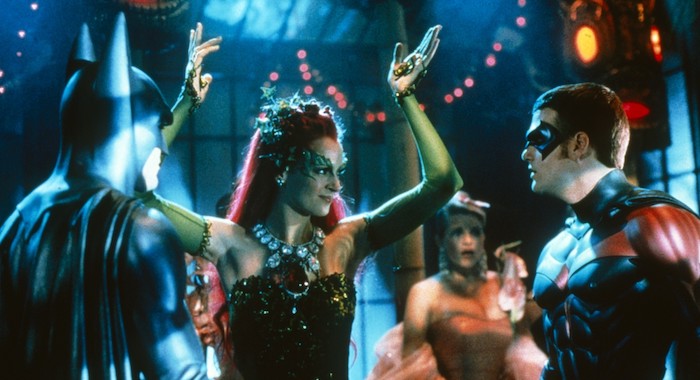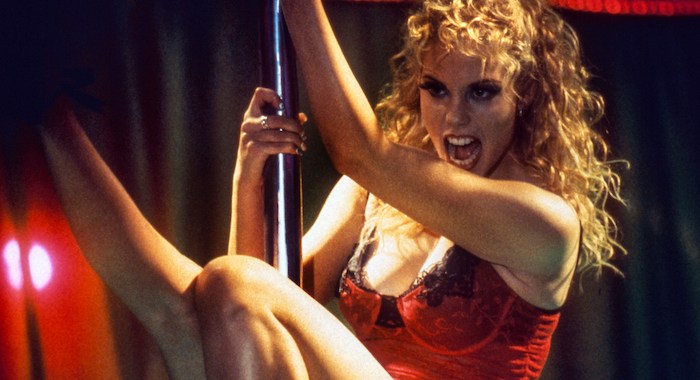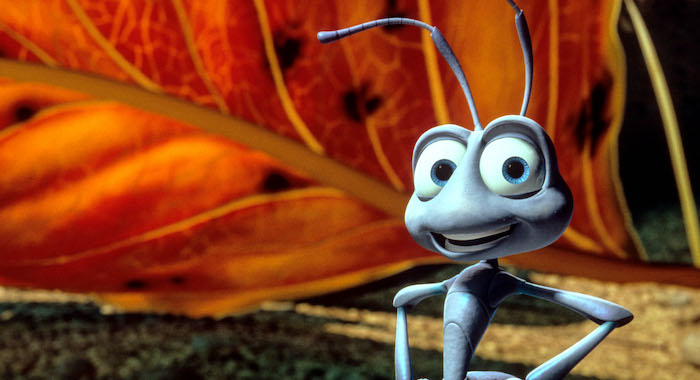Know Your Critic: Ian Thomas Malone – Writer, Podcaster, and Comedian
Malone talks epic classics and comic books, why A Bug’s Life is like Marxism 101, and misconceptions about LGBTQ+ representation in Hollywood.

(Photo by Warner Bros. / Courtesy Everett Collection, Columbia Tristar / Courtesy Everett Collection, Buena Vista Pictures / Courtesy Everett Collection)
“Know Your Critic” is a column in which we interview Tomatometer-approved critics about their screening and reviewing habits, pet peeves, and personal favorites.
It is delightfully obvious that Ian Thomas Malone isn’t exclusively a film critic – she’s a comedian, an entertainer in her own right.
Malone’s sense of humor lights up her work, be it via her reviews or her podcast. She cites media theorists like Barthes and Adorno in the same breath as she shares Tinder-related anecdotes or debates whether or not Batman is a sex symbol.
As she punches upward playfully and honestly – she laughs at herself, at the absurd and uncanny ways of the world – it’s clear she understands that there are always layers of power at play. She sets the terms, then invites the audience to meet her there.
Malone’s evergreen advice is to face the world, have fun, and make the most of it in your own way: “Life gives you lemons; you don’t have to make lemonade, you can make a lemon tart as well.”
Malone’s grandfather was a literary critic at the local paper in Connecticut; she wrote her first review at 11 years old. “I was always really fascinated by the idea that you could approach the medium as a way to be heard, to organize our thoughts and then actually get somebody to engage with what you had to say,” Malone said in an interview with Rotten Tomatoes.
“Film criticism for me is a good way to earnestly engage in another person’s art,” Malone shared. “It’s a powerful process to sit for an hour and a half or two hours, and engage in somebody else’s art, in the narrative that they tried to tell.”
Ian Thomas Malone is a film critic, author, comedian, and podcast host. Her podcast Estradiol Illusions has made the Apple Top 100 for TV & Film in over 80 countries. Find her on Twitter: @ianthomasmalone.
What is your favorite thing that you’ve seen so far this year?
Seeing Jackass 4 in theaters was really important to me because it’s just a communal thing, being back in the theater and laughing with a group of people. You don’t know them, and yet you do know them, because you’re all there to laugh at the same juvenile thing that you’ve been laughing about for 20 years.
And just recently, seeing Top Gun: Maverick in a theater full of people excited to gather around a movie that was engineered as an infomercial for the power of cinema. I mean, that’s what it was! And it worked. It was all this engineered emotion that was predictable.
I always think about how Kurt Vonnegut never really believed in suspense and would always spoil his novels at the beginning. Suspense is overrated. There’s something really beautiful in sitting down and expecting something and then having your expectations still surpassed. And I think for me, that was Top Gun: Maverick. I knew what I was going to get, but I didn’t know how good I was going to get it.
What’s your favorite screening snack?
I’ll never forget: I was covering a movie at Sundance – nobody eats at Sundance; I had two actual meals there – but I had Whoppers and a Snickers bar and some guy was like, “Oh, that’s the dinner of champions.” I was like, “Well, that is dinner.” He looked at me and it was really depressing as the reality dawned on him that I wasn’t joking.
Seltzer water, though, too. I’m from Connecticut. I have to drink seltzer.
What is your favorite classic film?
Lawrence of Arabia. If every Hollywood blockbuster epic strove to be like Lawrence of Arabia, we would be in much better shape. And I don’t say that going to an exotic location and using a white guy like a lot of movies made the mistake of, but it’s an epic… It’s truly an epic in every sense of the word.
I like movies that rise to the occasion. I think War and Peace did that. That movie, the ballroom scene, it’s just larger than life, and it reminds me, at least, why I can’t leave film criticism – because you sit down at a movie and you’re reminded, “S–t, this 100-year-old art form is still so capable of just making you cry.”
I cry very easily. It’s all the estrogen that you get at CVS.

(Photo by ©Warner Bros/Courtesy Everett Collection)
What’s a Rotten movie that you love?
Batman & Robin. People dunk on it. It’s the first gay superhero movie! It’s a homoerotic toy commercial. Batman is a guy who runs around on a roof – a billionaire in spandex. Batman is absurd… He should spend his money on social programs!
Batman & Robin is a comic book blockbuster where everybody showed up and did the role that they were supposed to do, and it was ridiculous. And yet at the same time, there’s no bad scenes in that whole movie! It’s entertaining from start to finish. It’s a total train wreck.
I’ll never, ever get sick of Batman & Robin. I don’t really ever need to watch The Dark Knight Rises ever again.
What do you think makes a “good” movie?
Basically, a good movie has to have good writing. It has to have good acting, and it needs to take some kind of position on the material.
It’s like, they titled the movie Batman v Superman and they didn’t really have them fight, and wondered why everybody was so pissed off at the end. They didn’t take a stance! Godzilla vs. Kong – one of them should win if you’re going to have a versus movie! And those are pedantic ways of saying, you have to actually try and make your audience feel.
What is the biggest misconception about critics?
Can I answer about the industry at large? I think the big misconception is that this industry is… You see all the time people talk about this “great LGBTQ takeover” and Disney has been framed as this great supporter of LGBTQ rights because they offered mild criticism against the Don’t Say Gay bill. Very mild, muted – and most importantly delayed – criticism of it.
The biggest misconception is how often people see the world in a binary sense.
It is true that LGBTQ visibility is improving. That doesn’t necessarily mean that LGBTQ visibility is good just because it is improving. It leaves LGBTQ people in a position where we have to say, “Hey, we still don’t really have meaningful representation,” and we already have to defend from the idea that what we do have, this small little sliver, is “too much.”
It’s still incredibly tough to be a marginalized critic. And other marginalized groups will tell you the exact same thing.

(Photo by ©United Artists/Courtesy Everett Collection)
Have you seen yourself in a character or in a story on screen and if so, what were you watching the first time you saw yourself?
Showgirls and Dirty Harry came to mind. Those are both terrible examples to name.
I would love if you said more about them.
I think when you’re a trans person, you spend years and years in the closet thinking that you can’t have what you want in life, and then you actually transition and you realize, “Hey, a lot of that is crap, and I can have everything.”
There’s something beautiful in a James Bond or a Mission: Impossible where they say to the protagonist – that’s not to say that I see myself in Tom Cruise or Daniel Craig, but film has this beautiful way of setting everybody up to say – “You’ve got a 1% chance of success.” You go out and you do it, and then the credits roll at the end and you did everything. I think film has a great way of reminding us that you can achieve the impossible, mostly if you get out of your own way.
Not to say that I identify with superheroes… I get told all the time that, “You’re so brave for being out as transgender.” It’s not bravery. It’s not bravery. These are literally my only cards. I can go curl up in a ball or I can try and make something of this life.
When my breakup happened, a four year relationship ends, you’re not really supposed to be back out on the field two weeks later, but I kept thinking to myself, “What am I supposed to do? Wear black?” I had all this surgery for years and years. I had my final surgery four days before the world shut down in COVID. It’s like, “Okay, the world ended. I’m living my best timeline, though. I guess I have to figure out a way to have fun in the rubble.” It’s like Mad Max.
Nobody gets what they want out of life. You have to be able to adjust to what life throws at you.
What is it about Showgirls?
Something that I relate to Showgirls: the world doesn’t really want trans people in it.
I think when you understand that the world is fundamentally an ugly place that doesn’t want you, it’s much easier to navigate it because, I don’t know, it’s freeing in a way.
I see Showgirls as a very empowering thing. Nomi Malone goes in – Elizabeth Berkley – and it’s a really ugly world that she’s able to thrive in, if only for a moment, too.
Because that’s the other thing. I was on a roll, and then that was all taken from me. All right, well, what can I do? You have to go forward. That’s all you’ve got.
I think it’s really hard as a trans person to sometimes get up, with all the ugliness, all the permissible ugliness, too. Like Ted Sarandos going around and saying, “No one would say that Dave Chappelle isn’t thoughtful” – as he’s regurgitating trans tropes that were dated by the early 2000s.
Yep.
That’s another empowering thing about Showgirls: Life is not a fair game. You don’t get all the cards you want, but you have to play the cards you have. And there’s joy in the mechanics of doing that.
I compare my dating life and everything to Gladiator constantly because at the end of the day, life is this big fight where you’re going up against insurmountable odds and it is important to stop and constantly ask not only yourself about the world around you: Are you not entertained? I actually don’t even like Gladiator as a movie, but I identify a lot with Russell Crowe’s character.
Being trans is about going into the lion’s den every day… Some people would say, “Why would you watch Ricky Gervais’s special?” And, the answer’s very clear: It’s about trans people. I’m trans! That’s literally my beat!
And people say, “Well, people are going to be angry at you.” Let them be angry!
When Dave Chappelle did his first special that I reviewed, Sticks & Stones, in 2019, somebody called me “Post-Op Malone.” I use that all the time.
People being mad at you for covering those things is unfair. They’re aiming their anger in the wrong direction.
When Sticks & Stones came out – this was two weeks before my bottom surgery – I probably got 6000 negative comments. A kid who went to my study abroad school in Australia said, “Why would you even watch it?”
And I said, “Can we consider the ramifications? What does it say if you tell a trans person they shouldn’t watch the thing that’s about trans jokes?”
Doesn’t that say that there’s something wrong with the jokes, if it’s humor that I literally can’t be a part of? I joke about trans things all the time!
In Sticks & Stones, he was talking about the differences within the LGBTQ community. The reality is he doesn’t know enough about it to take that joke further.
Trans people love to laugh at ourselves. I’ll be the first to laugh at a really good Ian Thomas Malone joke that’s on the internet. It’s when it’s mean spirited – “bathroom rapist,” is that really all you’ve got? It’s very cheap.

(Photo by ©Buena Vista Pictures/Courtesy Everett Collection)
What is your favorite film from your childhood?
I always say that A Bug’s Life is “Marxism 101” in terms of commodities, but it’s a hell of a good movie from start to finish! A Bug’s Life is the best Pixar movie because it’s a great testament to labor value against the bourgeoisie, who don’t do anything. Also it’s got a great voice cast. It’s funny. It makes you feel great. It’s totally derivative. It stole everything from Seven Samurai, but a lot of movies do.
In a world where labor is so exploited constantly, it’s a good movie to show kids to say, “Hey, this is your worth, and not only that, you’re a group of kids, you can go out and change the world if you don’t get stomped on by all the grasshoppers out there.”
What’s your favorite review you’ve ever written?
I like movies that challenge the form and make you think. Some film reviews are hard to write because it was good, but it didn’t really “wow” you and it was just entertaining.
Bloody Nose, Empty Pockets, you think, “Is this a documentary or not?” Beyond that, you think, “Am I qualified to even judge? I don’t know.” You sit down and write about it.
My favorite reviews to write are the ones where you think that the review is going to help you try and unpack something and then you finish your review and you’re like, “Did I actually figure out what this thing was supposed to be about?” You’re not sure.
I’ve always been very comfortable in the knowledge that I could be wrong about something. A film is the composite of thousands of people – not always thousands – working on a common goal and then the end product is 90 minutes, an absolute sliver of a percentage of the time and effort, blood, sweat, and tears that went into it. And when that finished product just clicks and you understand everything, that’s a beautiful feeling.
Who are some fellow critics or writers whose work you admire?
Most of the practical life philosophy I’ve learned, I’ve gotten from Middlemarch and War and Peace. I think those two very long books teach you more or less everything you need to know about humanity. Everything you need to learn about life was written in the 1800s. [laughs] No, that’s just the English student in me talking.
Film narratives have this small sliver of time to leave an impression. It’s really impressive when a movie like Field of Dreams, an hour forty-five, that movie can make grown men cry. A lot of books it takes 1000 pages to really draw the tears for some other people.
It’s remarkable, the impact that film is able to leave on people in small slivers of time.
Ian Thomas Malone is a film critic, author, comedian, & podcast host. Her podcast Estradiol Illusions has made the Apple Top 100 for TV & Film in over 80 countries. Find her on Twitter: @ianthomasmalone.





